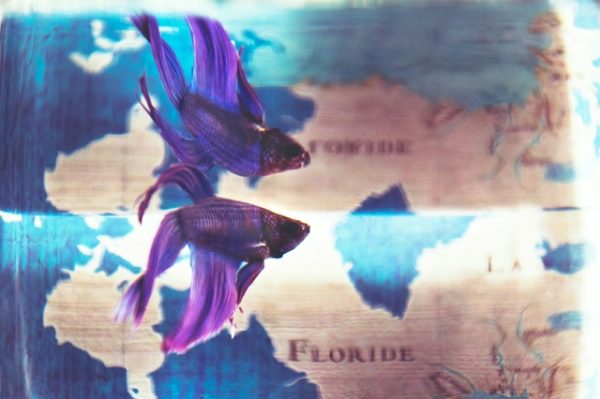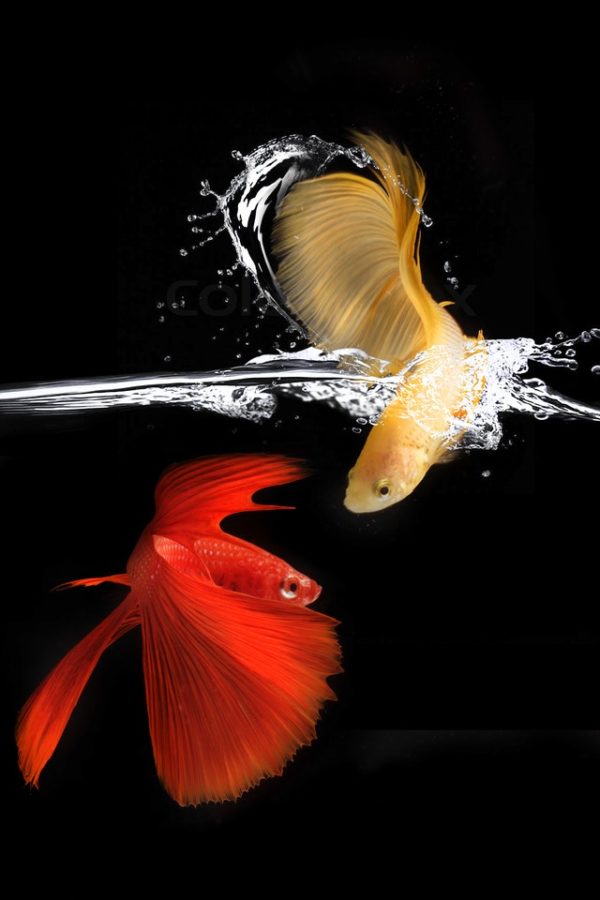A Siamese fighting fish, often commonly known as betta fish, is a beginner-friendly species to take care of. If you are starting as a beginner aquarist, this species is one of the best. However, especially with the feeding cycle, one needs to be extra cautious. From the kind of food to the frequency, everything plays a crucial role.
Despite the type of betta fish you house in your aquarium, you need to be mindful of their eating habits. Since these fish are so small in size, overfeeding is a common issue for them. Typically, a standard and healthy betta fish should be fed twice a day and in the right quantities.

Since you are here, we assume you are new to a betta fish in your aquarium. Just keep in mind that the only issue you don’t want to do is overfeed them. Excessive eating can cause gastrointestinal problems along with other health concerns.
If you want a detailed guide, this article should give you a preface to all the requirements you likely need to know.
Table of Contents
How Often Should One Feed a Betta Fish?
Betta fish are surface feeders. So, they won’t always venture down to the bottom of the tank in search of food.
This implies that you need to feed them actively and just rely on pellets to do their job. When it comes to the frequency of feeding, betta fish should be fed twice a day.
This is a standard feeding habit and applies to every species or type of betta available in the market. However, the feeding process is also quite subjective. This means that some fish need less food, especially if they aren’t the most active in the tank.
So, keep twice a day as your baseline. And feed the betta fish depending on their needs and how much they feed in a minute or two.
Overfeeding leads to risks of GI issues and accumulation of waste too. If you aren’t actively cleaning the aquarium, the fish can risk infections and other diseases.
Betta Fish Diet
Betta fish are omnivores. This implies that their diet involves both animal and plant matter. Typically, they are more inclined towards animal products and their prey in the tank. Therefore, to maintain their nutritional balance, you need to feed them a high-protein diet most days of the week.
If you are concerned about what kind of diet works best for them, we have broken them down for you:
Fish flakes
Since bettas are surface feeders, flakes work as the ultimate food option. They remain on the surface, allowing your betta to come up and gobble it down. However, when buying fish flakes, avoid tropical fish flakes. These have very little protein content in them.
Instead, ask the shop owner about a high-protein option. They should have fish flakes formulated specifically for bettas. Stick to buying those instead. However, with flake foods, you should give the fish as much as they can eat. Don’t dump a lot on the surface and walk away.
Baby pellets
Another popular fish food for bettas that they like is baby pellets. They are packed with protein and are lightweight, enabling them to stay on the surface. As a result, they don’t sink immediately. Some pellets even have color-enriching properties that make the betta’s color pop.
The baby pellets are specifically designed to fit the feeding needs of the betta. They are small in size, float, and are easy to digest. This matches the nutrient requirement and prevents wastage.
Betta pellets are available in abundance in the market. Just ensure to read the labels properly so you don’t end up feeding fillers.
Freeze-dried foods
Another good-quality food that bettas appreciate is freeze-dried pellets. This is ideal for aquarists who don’t fancy dealing with live foods. Finally, you can source good-quality brine shrimp and bloodworms that are high in protein. They are readily available and don’t have the risks of having parasites in them.
However, don’t make this the sole feeding element. Since the betta are dried, they lack moisture and have additives in them. Simply feeding this will cause risks of digestive issues. If you want to add some moisture, mix the freeze-dried food with some treated water.
If you include freeze-dried foods, include them 2-3 times a week only.
Live foods
This makes up the majority of the feeding cycle. Live foods like mosquito larvae, bloodworms, brine shrimp, Mysis shrimp, etc., make for the best foods. The betta fish rely on these food sources in the wild too. So, if you want them to feed as they do in the wild, including live foods is a must.
Live foods also have a high protein content in them. This allows them to grow and live a substantial life. So you should get access to live foods pretty easily in the stores.
How Much Food Should you Feed your Betta Fish?

Now that you have a basic idea about the food let us focus on the quantity.
How much food is too much?
Typically, as we said before, betta fish should be fed only twice a day.
The anatomy of a betta fish suggests they have a tiny stomach. So, overfeeding is a common issue with them. Besides the stomach, even their intestinal pathway is short.
When feeding the fish pellets or flakes, be aware of the quantity. Since they are dried foods, interaction with moisture doubles them in size. So, excessive feeding can cause bloating in the betta.
Live and frozen foods are typically the best feeding choice. They are easy to digest and have the maximum nutrition in them. So, add a small number of live foods to the everyday diet without fail. Here’s a quick breakdown of the feeding schedule:
| Day | Pellets / Flakes | Live Food |
|---|---|---|
| Monday | Fasting | Fasting |
| Tuesday | A pinch | 2-3 pieces |
| Wednesday | Fish or betta pellets (twice) | None |
| Thursday | Fish or betta pellets (twice a day) | 1-2 pieces |
| Friday | None | 2-3 pieces of live or frozen food |
| Saturday | Fish or betta pellets (twice) | None |
| Sunday | Fish or betta pellets (twice) | None |
Keep in mind that the adult and mature betta needs less food. If you are feeding a betta fry, their food quantity and frequency is more in comparison. They need optimal nutrition to grow and mature.
Why is Fasting Needed for Betta Fish?
Betta fish have a small stomach and prolonged digestion. This is because their body needs time to process and digest their food and be hungry for their next feed.
So, if you are wondering how long a betta fish can fast for, the answer is up to two weeks.
Experienced aquarists suggest fasting once a week for the betta fish to prolong their lifespan. This positively affects their health. Also, fasting allows their body to recover after a feed and process the food too.
The reason why fasting is more important is to process the dried pellets and flakes. Since this makes up for the majority of their diet, giving them time to recuperate is necessary. In addition, if the pellets and flakes aren’t processed, the fish can develop blockages and accumulation.
How Often Should One Feed a Baby Betta Fish?
As we said, a betta fry needs more food than an adult betta. So, blindly following the diet of a mature betta won’t reap good results for a fry.
The betta fry needs 3-5 meals a day that should be 4-5 hours apart. Sometimes, a fry can even eat up to six times a day. The meals should be small and protein-rich.
Also, make sure the water should be on a warmer side of around 80-82 degrees Fahrenheit.
Make sure that you check your heater before you indulge in the feeding. Sometimes, an extremely high temperature can result in even more risk.
Why is my Betta Fish not Eating?
Like humans, bettas also run into risks of physical and psychological issues that affect their eating habits. So if your betta isn’t eating, you need to investigate immediately.
However, some of the causes behind it include:
Stress
First and likely the most important factor worth considering is stress. The new home syndrome is one of the leading causes of stress. They take some time to adapt to their new surroundings, leading to bouts of lacking appetite.
Inadequate Water Parameters
Another common reason that contributes to poor appetite is improper water conditions. Unstable water temperature, pH levels, and even water hardness can make the tank inhabitable.
Water temperature below 76 degrees Fahrenheit leads to poor metabolism. This inadvertently affects their appetite gravely. Ideally, you want the water temperature to stay between 76- and 81-degrees Fahrenheit.
Also, unclean water can heighten ammonia and nitrate levels in the tank. This can make your betta fish sick. So, check the water conditions and change them if needed.
Illness
Infections and ich disease are two of the common issues that can hamper your betta’s appetite. So if you find abdominal swelling or reduced activity, check for any infections or other diseases.
Wrapping Up
Betta fish is resilient and hardy. However, when it comes to feeding, an aquarist needs to be mindful of several factors. First, always focus on keeping their diet protein-rich with a carnivorous diet. Second, besides the food, focus on the quantity and the frequency of the feed as well.
Since overfeeding is a very common issue with a betta, you want to avoid it as much as possible. Also, stick to feeding your betta a balanced diet instead of just feeding one type of food.
We hope this article gives you all the possible insights that you need to keep your betta healthy. If you have some queries, leave us a comment, and we’d be happy to help.
No related posts.
